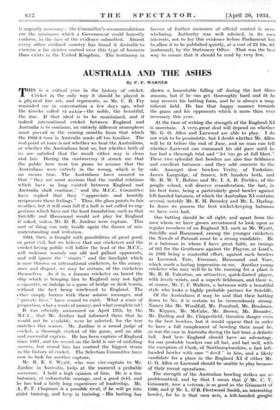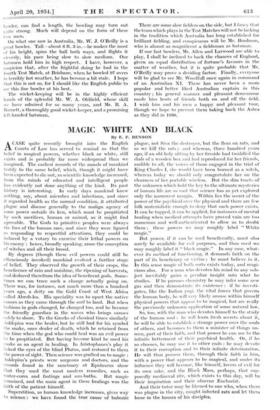AUSTRALIA AND THE ASHES
By P. F. WARNER THIS is a critical year in the history of cricket. 1- Cricket in the only way it should be played is a physical fine art, and represents, as Mr. C. B. Fry reminded me in conversation a few days ago, what the Greeks called To.KaX.6v—the noble, the beautiful, the fine. If that ideal is to be maintained, and if indeed international cricket between England and Australia is to continue, an entirely different atmosphere must prevail in the coming months from that which the 1932-3 tour in Australia made all too familiar. The real point at issue is not whether we beat the Australians, or whether the Australians beat us, but whether both of us are satisfied that the result either way is clean and fair. During the controversy it struck me that the public here were too prone to assume that the Australians were entirely in the wrong, which is by no means true. The Australians have assured us that " they are most anxious that the cordial relations which have so long existed between England and Australia shall continue," and the M.C.C. Committee have replied that they " appreciate and heartily reciprocate those feelings." Thus, the glass points to fair -weather, but it will soon fall if a halt is not called to sug- gestions which have not the least foundation, such as that Sutcliffe and Hanunond would not play for England if asked, unless Mr. D. R. Jardine were captain. This sort of thing can only kindle again the flames of mis- understanding and irritation.
1934, then, is fraught with possibilities of great good, or great evil, but we believe that our cricketers and the cricket-loving public will folhiw the lead of the M.C.C., will welcome warmly our old and gallant opponents, and will ignore the " stunts " and the limelight which is now thrown on international cricketers, to the annoy- ance and disgust, we may be certain, of the cricketers themselves. As it is, a famous cricketer on board the ship which is bringing him to -England may not light a cigarette, or indulge in a game of bridge or deck tennis, without the fact being wirelessed to England. The ether simply buzzes with these asinine messages, and " private lives " have ceased to exist. What a sense of proportion, what a waste of money, and what complete rot !
It was officially announced on April 12th, by the M.C.C., that Mr. Jardine had informed them that he would not be available, were he selected, for the test matches this season. Mr. Jardine is a sound judge of cricket, a thorough student of the game, and an able and successful captain. He has been captain of England since 1931, and his record on the field is one of unfailing success, but round him has centred the biggest storm in the history of cricket. The Selection Committee have now to look for another captain.
Mr. R. E. S. Wyatt, who was vice-captain to Mr. Jardine in Australia, looks at the moment a probable successor. I hold a high opinion of him. He is a fine batsman, of indomitable courage, and a good field, and he has had a fairly long experience of leadership. Mr. A. P. F. Chapman is a possible rival, if -he will go into strict training, and keep in training. - His batting has shown a lamentable falling off during the last three seasons, but if he can get thoroughly hard and fit he may recover his batting form, and he is always a mag- nificent field. He has that happy manner towards the game and his opponentS which is more than ever necessary this year.
At the time of writing the strength of the England XI is uncertain. A very. great deal will depend on whether Mr. G. 0. Allen and Larwood are able to play. I do not wish to be pessimistic, but I doubt whether Mr. Allen will be fit before the end of June, and no man can tell whether Larwood can command his old pace until he has had a thorough trial and " let 'em go at full blast.';' These two splendid fast bowlers are also fine fieldsmen and excellent batsmen—and they add concrete to the side. Amongst slow bowlers Verity, of Yorkshire, James Langridge, of Sussex, left handers both, and Mr. R. W. V. Robins and Mr. I. A. R. Peebles, of the googlie school, will deserve consideration, the last, in his best form, being a particularly good bowler against left-handed batsmen, of which the Australian XI contains several, notably Mr. E. H. Bromley and Mr. L. Darling. In Ames we possess the best wicket-keeping batsman we have ever had.
Our batting should be all right, and apart from the men whom we have grown accustomed to look upon as regular members of an England XI, such as Mr. Wyatt, Sutcliffe and Hammond, among the younger cricketers the Nawab of Pataudi must be a strong candidate. He is a batsman in whom I have great faith, an innings of 165 for the Gentlemen against the Players, at Lord's, in 1932 being a masterful effort, against such bowlers as Larwood, Tate, Freeman, Hammond and Voce, which made a lasting impression on me. Another young cricketer who may well be in the running for a place is Mr. B. H. Valentine, an attractive, quick-footed player, with lovely wrists, and a superb fieldsman, and there is, of course, Mr. C. F. Walters, a batsman with a beautiful style who looks a highly probable partner for Sutcliffe.
Of the Australians it may be said that their batting down to No. 6 is certain to be tremendously strong. Names like Mr. Woodfull, Mr. Ponsford, Mr. Bradman, Mr. Kippax, Mr. McCabe, Mr. Brown, Mr. Bromley, Mr. Darling and Mr. Chipperfield, threaten danger even to the best bowlers, but it would appear that in order to have a full complement of bowling there must be, as was the case in Australia during the last tour, a definite tail. And here England should have an advantage, for our probable bowlers can all bat, and bat well, with the exception of Clark, of Northamptonshire, a fast left- handed bowler with rare " devil " in him, and a likely candidate for a place in the England XI_ if either Mr. G. 0. Allen or Larwood should-be unable to play because of their recent operations. • The strength of the Australian bowling strikes me as problematical, and by that I mean that if Mr. C. V. Grimmett, now a veteran, is as good as the Grimmett of 1980, and if Mr. L. O'B. Fleetwood Smith, an interesting bowler, for he is that rara avis, a left-handed googlie bowler, can find a length, the bowling may turn out quite strong. Much will depend on the form of these two men.
On what one saw in Australia, Mr. W. J. O'Reilly is a great bowler. Tall—about 6 ft. 3 in.—he makes the most of his height, spins the ball both ways, and flights it cleverly, his pace being slow to slow medium. Our batsmen hold him in high respect. I have, however, a suspicion that, after the frightful, doing he had in the fourth Test Match, at Brisbane," when he bowled 97 overs in terribly hot weather, he has become a bit stale. I hope that this is not so, for I should like the English public to see this fine bowler at his best.
The wicket-keeping will be in the highly efficient hands of the splendid Mr. W. A. Oldfield, whose skill we have admired for so many years, and Mr. B. A. Barnett, a thoroughly good wicket-keeper, and a promising left-handed batsman. There are some slow fielders on the side, but I fancy that the team which plays in the Test Matches will not be lacking in the tradition which Australia has long established for brilliant fielding, and conspicuous will be Mr. Bradman, who is almost as magnificent a fieldsman as batsman.
If our fast bowlers, Mr. Allen and Larwood are able to play, I shall be inclined to baCk the chances of England, given an equal distribution of fortune's favours in the matter of weather, but it is quite probable that Mr. O'Reillymay prove a deciding factor. Finally, everyone will be glad to see Mr. Woodfull once again in command of an Australian XI. There has never been a more popular and better liked Australian captain in this country ; his general manner and pleasant demeanour made him hosts of friends both on and off the field. I wish him and his men a happy and .pleasant tour, though we hope to prevent them taking back the Ashes as they did in 1930.













































 Previous page
Previous page